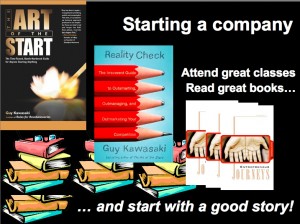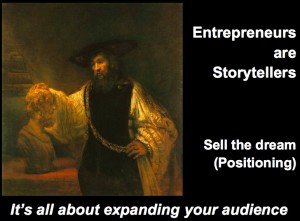 It is simply a great pleasure to step into a class of some eighty highly motivated students: when I asked who planned to start a company one day, at least half of them raised their hands!
It is simply a great pleasure to step into a class of some eighty highly motivated students: when I asked who planned to start a company one day, at least half of them raised their hands!
The name of the course for which I was a guest speaker is “Leadership and Networking,” taught by Bob Lowry. One of the books that they are currently discussing in the course is the 1936 bestseller by Dale Carnegie (no relation with Andrew Carnegie): How to Win Friends & Influence People. Although it was published more than seventy years ago, this book remains a must read – and given that it still inspires modern authors focusing on both leadership and influence, it’s never a waste of time to leaf through pages that were groundbreaking at the time.
The theme of my speech was that starting a company is a lot about “winning people to your way of thinking.” To do that, you certainly have to think about all the rules that enable you to influence people, and in particular, you have to learn how to tell your story – and tell it to an ever-expanding audience. As you analyze your product idea, position your project competitively, define its features, you always end up addressing people. Because companies and products are created by people for people.
 Where do you start? Read good books. The Art of the Start and Reality Check by Guy Kawasaki are the best ones. I also like Sramana Mitra’s series, Entrepreneur Journeys, because they provide portraits of entrepreneurs. Then, create your own story. Feel it. Live it. Discuss your project with those who are the closest to you, generally your family – because more often than not, they are the most likely to give you a frank opinion and support your efforts. If you want to create a five-wheel car, they won’t feel obligated to tell you politely that it’s “interesting.” Although it is possible that what you want to do is well above their head or their domain of interest or expertise, they will ask you the first hard questions (What’s the use of it? How come nobody had this idea before? Are you sure that people want this kind of stuff?). You have to recount a compelling story on why you, of all people, would be able to do something that nobody does or cannot do as well as you think you can.
Where do you start? Read good books. The Art of the Start and Reality Check by Guy Kawasaki are the best ones. I also like Sramana Mitra’s series, Entrepreneur Journeys, because they provide portraits of entrepreneurs. Then, create your own story. Feel it. Live it. Discuss your project with those who are the closest to you, generally your family – because more often than not, they are the most likely to give you a frank opinion and support your efforts. If you want to create a five-wheel car, they won’t feel obligated to tell you politely that it’s “interesting.” Although it is possible that what you want to do is well above their head or their domain of interest or expertise, they will ask you the first hard questions (What’s the use of it? How come nobody had this idea before? Are you sure that people want this kind of stuff?). You have to recount a compelling story on why you, of all people, would be able to do something that nobody does or cannot do as well as you think you can.
 The skepticism of people you trust may very well infuriate you, but will force you to hone your arguments – and if the topic is difficult, to express your hyper-sophisticated system in layman terms. This is not silly at all. Think of it this way: If you go public one day, you will have to offer a plain story to thousands of John Doe’s so that they buy your stocks. Incidentally, it’s also only if they have an idea of what you are talking about that your family will bear with the fact that you will work around the clock, take no vacation, live on a shoestring, etc.! One of the students, Tia, wondered if becoming an entrepreneur was putting a strain on personal relationships. To which I responded that it often does and that entrepreneurs have to be aware of it. To make good, though, I also added that personal relationships that collapse because of this, would most likely collapse anyway!
The skepticism of people you trust may very well infuriate you, but will force you to hone your arguments – and if the topic is difficult, to express your hyper-sophisticated system in layman terms. This is not silly at all. Think of it this way: If you go public one day, you will have to offer a plain story to thousands of John Doe’s so that they buy your stocks. Incidentally, it’s also only if they have an idea of what you are talking about that your family will bear with the fact that you will work around the clock, take no vacation, live on a shoestring, etc.! One of the students, Tia, wondered if becoming an entrepreneur was putting a strain on personal relationships. To which I responded that it often does and that entrepreneurs have to be aware of it. To make good, though, I also added that personal relationships that collapse because of this, would most likely collapse anyway!
So, you have to position your story for your immediate environment. Then, you must extend your circle as you look for co-founders and early employees. Your story is again put to the test. They may ask you about the company’s roadmap and product delivery timeline. Then comes the circle of mentors and advisors, who may have (or preferably have) a prior experience in the domain that you try to tackle, and ultimately early adopters who really know what they need and will buy your concepts only it these serve a business they ultimately know better than you do. As you expand your audience and reach for people who are not waiting for you as a Messiah, your story has to become increasingly compelling, and your beliefs must turn into measurable results. Ultimately, the extensibility of your story and of your influence show whether or not you have a real business.
Some students in the room already have the idea for a business. One of them, Derek, sells Tshirts. “Why should I buy one?” I asked as uncharitably as I could. He hesitated a few seconds, but came up with a reasonably good response.
The class is led by a real entrepreneur, a UMass alumnus, Bob Lowry. After college he didn’t know what to do and worked at various odd jobs until one day he spotted a “for rent” sign in the window of a place next door to a popular pizzeria in Amherst. He thought that a burrito shop would appeal to students, convinced his dad to invest $20,000, and four months later his first restaurant, Bueno Y Sano, was up and running. I tried the one he later opened in Northampton. I recommend it. I ordered a chicken quesadilla. Exactly what I expected. Simple, healthy and good ingredients – and a remarkable turnout at 3:30 PM! When he had his students’ average age (21), Bob had no idea of what he would do – if he would even be an entrepreneur. It’s the same for me (I was translating John Locke’s early works into French!). So when one of the students asked me how she could find a business idea, I simply responded that ideas usually come unexpectedly to people who are open minded. The important thing is to follow one’s passion and work hard.
Thanks to this wonderful class and to Bob! Just tweet a little bit more (congrats to @genuinejack)…
Marylene Delbourg-Delphis
For more information about Dale Carnegie: http://en.wikipedia.org/wiki/Dale_Carnegie and http://en.wikipedia.org/wiki/How_to_Win_Friends_and_Influence_People
For more information about Bob Lowry and Bueno y sano http://www.buenoysano.com/aboutbys.html

1 response so far ↓
1 Bob Lowry // Oct 3, 2009 at 8:04 am
Marylene,
The students were thrilled with your talk.
You inspired them to be open for that idea to turn up. You also gave them insight as to how it feels and looks when you find it.
It was a great moment for me to be in a university classroom where the instructor was incredulous at how few of the students are on Twitter. What are they waiting for??? Build that audience!
Thank you!
Bob
Leave a Comment